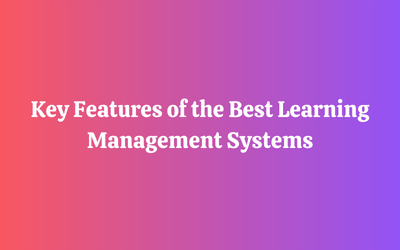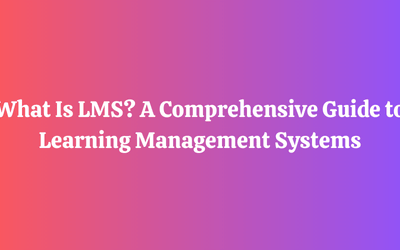What is an Enterprise learning management system (LMS)?
What is an Enterprise learning management system (LMS)?
A central platform for overseeing employee training and activities is an enterprise learning management system. Businesses may measure learning, manage certifications, and arrange training materials with the aid of a corporate LMS.
In short, an Enterprise learning solution:
- By honing employee abilities, collaboration is made easier and productivity is increased.
- Simplifies the production of compliant, compelling digital content in a variety of formats.
- Gives stakeholders, including managers and employees, access to the resources they require whenever they need them.
- Reduces the cost of outsourcing, lowers employee churn and raises engagement levels for all employees.
- Reports on individual development to identify holes in learning programs.
How to choose the best Enterprise LMS
There is no one size fits all enterprise LMS software.
The most crucial factor to take into account when selecting an enterprise learning management system is how well its capabilities and features will complement your company’s objectives.
For you to compare the top enterprise LMSs on our list, we’ve defined use scenarios and crucial features.
Use cases
A corporate LMS may simplify daily management, lessen manual adjustments, and help your company maintain its training current. A unified system also gives you more time to concentrate on enhancing staff retention, productivity, and engagement.
In a global, hybrid work environment, an enterprise learning solution can also help you save money by eliminating the need for pricey on-site trainers, whose effectiveness is unpredictable and whose prices are high. A corporate LMS, on the other hand, makes learning accessible whenever and wherever your staff members and management need it.
So let’s look at some enterprise LMS benefits.
Implementation speed
While evaluating enterprise LMS software, you should find out how long it takes to implement the platform.
For instance, you should search for an enterprise LMS with a short deployment timeframe if you need to quickly have a system up and operating.
But keep in mind that getting things done is only half the battle. User adoption is crucial to ensuring that your managers and staff are educated and applying their knowledge.
So, although implementation speed is an important factor, it is not the only one.
Usability
The usability of a corporate LMS is a major factor as well.
- How simple is it to learn the platform?
- Its interface, is it user-friendly? Several roles and permissions may be set.
- Which content delivery formats are available?
- Does the platform have reporting and analytics tools?
Expert advice: To make sure the enterprise LMS contains features that can assist users to execute their jobs more effectively, speak with those who will be using the platform to learn more about their daily tasks and long-term objectives.
Scale and pricing
Pricing and how well an enterprise LMS will scale to your firm are further considerations.
Some solutions work better for mid-market companies or startups, while others are better suited for large multinational corporations.
Also, prices could change according to the number of users. Examine the pricing structures of each enterprise learning management system to prevent unanticipated costs.
Compliance
You should also look into compliance and security while choosing the best enterprise LMS.
To make sure you’re collecting data responsibly and securely, you should pick a platform that is in line with the policies of your organization.
Features
Bursts of learning are known as microlearning. Instead of a marathon cram session, microlearning is more like a sprint. Employees and management can review training and how-to materials using microlearning as needed. In other words, by making the information readily available on demand, microlearning systems reinforce the knowledge.
Collaboration: Some people are excellent at self-directed learning. But some of the best education takes place in social settings. Just picture astronauts sharing a space station or researchers working on medical discovery.
Seek an enterprise LMS that promotes staff involvement and cooperation.
For instance, social interactions like the ability to “like,” “share,” and “comment” on training information on blogs, wikis, discussion boards, and the like can keep staff members engaged and involved in your learning initiative. In addition, gamification tools like leaderboards and medals can encourage staff members to interact with one another and learn from their colleagues.
You may directly generate content inside your workplace LMS thanks to built-in writing. With this functionality, you may produce content for your enterprise learning platform without having to relocate it from another location or change it.
Testing and evaluation: While no one enjoys a pop quiz, it’s important to be able to test and evaluate employee progress if you want to maximize your students’ learning.
Content management: Is there a content library on the platform you’re thinking about using? Inquire into the creation, distribution, and editing of training materials. You might wish to choose a different provider if the procedures are complicated and the paperwork is spotty.
Reporting and analytics: A platform with integrated reporting and analytics will be very helpful if you want to monitor employee learning and the effectiveness of your training initiatives. Managers, business developers, and revenue leaders may invest in areas that spur growth by knowing what content is performing, where users are encountering obstacles, and what formats they are interacting with most.
Localization
You won’t have to develop separate instances of an object for each language because a business learning platform with localization provides translation across the platform, saving you valuable time by eliminating the extra work.
Learn More
Our News
- AI
- Animations
- Articulate
- Articulate 360
- Articulate Engage
- Articulate Live
- Articulate Presenter
- Articulate Quizmaker
- Articulate Replay
- Articulate Review
- Articulate Storyline
- Articulate Storyline 3
- Articulate Studio
- bite sized learning
- Characters
- Content Library
- Corporate Communication
- E-Learning
- e-Learning Authoring Tools
- Employee Engagement
- Game-Based Learning
- Gamification
- Gamiflexer
- Go Sales
- Healthcare
- Instructional Design
- Interactivity
- Knowledge Transfer
- L&D Trends
- Learning
- Learning & Development
- Learning Experience platform
- Learning Management System
- LMS
- LXP
- Microlearning
- mLearning
- Mobile Learning
- Nugget Learning
- Online Training
- Peek
- Performance Support
- Preso
- Quiz and Assessment Platform
- Replay 360
- Rise
- SCORM
- Screen Capture
- Software
- Storyline 360
- Studio 360
- Training Management
- Trainings
- Uncategorized




